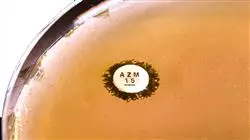University certificate
The world's largest faculty of medicine”
Introduction to the Program
Thanks to this 100% online Postgraduate Certificate, you will perform accurate diagnostics to identify bacterial infections that require antimicrobial therapies using the most innovative laboratory techniques"

Surveillance of Antimicrobial Resistance in animals is essential for the protection of Public Health. In this regard, data collected through these programs allow clinicians to identify emerging trends, evaluate the effectiveness of interventions and develop evidence-based policies. A recent report reveals that 30% of bacterial infections in farm animals are resistant to standard antibiotic treatments, underscoring the urgency of improving control. Faced with this, practitioners have a responsibility to implement these surveillance systems and to implement strategies to combat this antibiotic rejection.
In this scenario, TECH launches a revolutionary Postgraduate certificate on Antimicrobial Resistance in Animal Health. Designed by specialists in this field, the academic itinerary will delve into the causes of antibiotic rejection in the veterinary field. Therefore, graduates will select the most appropriate antimicrobials to treat infections. Likewise, the syllabus will delve into the different species of multi-resistant bacteria according to their impact on Animal Health. In the same line, the program will provide the practitioners with the most effective strategic plans to reduce the risk of spreading antibiotic resistance. During the course of the degree, professionals will acquire the One Health approach, which will enable them to establish surveillance systems to monitor and respond to diseases.
Moreover, the university program is complemented by multiple multimedia pills, specialized readings and case study simulations. This will allow physicians to engage in a fully dynamic learning process. The only thing professionals will need is a digital device with Internet access to access the Virtual Campus. At the same time, it will remain available 24 hours a day. And all this without in person attendance or preset schedules.
A university program that prepares you to meet the challenges in the field of Antimicrobial Resistance in Animal Health"
This Postgraduate certificate in Antimicrobial Resistance in Animal Health contains the most complete and up-to-date scientific program on the market. The most important features include:
- The development of practical cases presented by experts in Microbiology, Medicine and Parasitology
- The graphic, schematic and eminently practical contents with which it is conceived gather scientific and practical information on those disciplines that are indispensable for professional practice
- Practical exercises where the self-assessment process can be carried out to improve learning
- Its special emphasis on innovative methodologies
- Theoretical lessons, questions to the expert, debate forums on controversial topics, and individual reflection assignments
- The availability of access to the content from any fixed or portable device with an Internet connection under individual reflection
You will gain insight into the Dissemination of Antibiotic Resistance Genes, which will allow you to choose the most appropriate therapies to combat pathologies"
The program’s teaching staff includes professionals from the industry who contribute their work experience to this program, as well as renowned specialists from leading societies and prestigious universities.
The multimedia content, developed with the latest educational technology, will provide the professional with situated and contextual learning, i.e., a simulated environment that will provide immersive education programmed to learn in real situations.
This program is designed around Problem-Based Learning, whereby the professional must try to solve the different professional practice situations that arise during the course. For this purpose, students will be assisted by an innovative interactive video system created by renowned and experienced experts.
Looking to incorporate state-of-the-art techniques for diagnosing bacterial infections requiring antimicrobial treatment into your practice? Achieve it through this program"

TECH Relearning methodology will allow you to update your knowledge in an autonomous and progressive way"
Why study at TECH?
TECH is the world’s largest online university. With an impressive catalog of more than 14,000 university programs available in 11 languages, it is positioned as a leader in employability, with a 99% job placement rate. In addition, it relies on an enormous faculty of more than 6,000 professors of the highest international renown.

Study at the world's largest online university and guarantee your professional success. The future starts at TECH”
The world’s best online university according to FORBES
The prestigious Forbes magazine, specialized in business and finance, has highlighted TECH as “the world's best online university” This is what they have recently stated in an article in their digital edition in which they echo the success story of this institution, “thanks to the academic offer it provides, the selection of its teaching staff, and an innovative learning method aimed at educating the professionals of the future”
A revolutionary study method, a cutting-edge faculty and a practical focus: the key to TECH's success.
The most complete study plans on the university scene
TECH offers the most complete study plans on the university scene, with syllabuses that cover fundamental concepts and, at the same time, the main scientific advances in their specific scientific areas. In addition, these programs are continuously being updated to guarantee students the academic vanguard and the most in-demand professional skills. In this way, the university's qualifications provide its graduates with a significant advantage to propel their careers to success.
TECH offers the most comprehensive and intensive study plans on the current university scene.
A world-class teaching staff
TECH's teaching staff is made up of more than 6,000 professors with the highest international recognition. Professors, researchers and top executives of multinational companies, including Isaiah Covington, performance coach of the Boston Celtics; Magda Romanska, principal investigator at Harvard MetaLAB; Ignacio Wistumba, chairman of the department of translational molecular pathology at MD Anderson Cancer Center; and D.W. Pine, creative director of TIME magazine, among others.
Internationally renowned experts, specialized in different branches of Health, Technology, Communication and Business, form part of the TECH faculty.
A unique learning method
TECH is the first university to use Relearning in all its programs. It is the best online learning methodology, accredited with international teaching quality certifications, provided by prestigious educational agencies. In addition, this disruptive educational model is complemented with the “Case Method”, thereby setting up a unique online teaching strategy. Innovative teaching resources are also implemented, including detailed videos, infographics and interactive summaries.
TECH combines Relearning and the Case Method in all its university programs to guarantee excellent theoretical and practical learning, studying whenever and wherever you want.
The world's largest online university
TECH is the world’s largest online university. We are the largest educational institution, with the best and widest online educational catalog, one hundred percent online and covering the vast majority of areas of knowledge. We offer a large selection of our own degrees and accredited online undergraduate and postgraduate degrees. In total, more than 14,000 university degrees, in eleven different languages, make us the largest educational largest in the world.
TECH has the world's most extensive catalog of academic and official programs, available in more than 11 languages.
Google Premier Partner
The American technology giant has awarded TECH the Google Google Premier Partner badge. This award, which is only available to 3% of the world's companies, highlights the efficient, flexible and tailored experience that this university provides to students. The recognition as a Google Premier Partner not only accredits the maximum rigor, performance and investment in TECH's digital infrastructures, but also places this university as one of the world's leading technology companies.
Google has positioned TECH in the top 3% of the world's most important technology companies by awarding it its Google Premier Partner badge.
The official online university of the NBA
TECH is the official online university of the NBA. Thanks to our agreement with the biggest league in basketball, we offer our students exclusive university programs, as well as a wide variety of educational resources focused on the business of the league and other areas of the sports industry. Each program is made up of a uniquely designed syllabus and features exceptional guest hosts: professionals with a distinguished sports background who will offer their expertise on the most relevant topics.
TECH has been selected by the NBA, the world's top basketball league, as its official online university.
The top-rated university by its students
Students have positioned TECH as the world's top-rated university on the main review websites, with a highest rating of 4.9 out of 5, obtained from more than 1,000 reviews. These results consolidate TECH as the benchmark university institution at an international level, reflecting the excellence and positive impact of its educational model.” reflecting the excellence and positive impact of its educational model.”
TECH is the world’s top-rated university by its students.
Leaders in employability
TECH has managed to become the leading university in employability. 99% of its students obtain jobs in the academic field they have studied, within one year of completing any of the university's programs. A similar number achieve immediate career enhancement. All this thanks to a study methodology that bases its effectiveness on the acquisition of practical skills, which are absolutely necessary for professional development.
99% of TECH graduates find a job within a year of completing their studies.
Postgraduate Certificate in Antimicrobial Resistance in Animal Health
The Postgraduate Certificate in Antimicrobial Resistance in Animal Health created by TECH Global University is a specialised qualification aimed at veterinary professionals who wish to acquire advanced knowledge on antimicrobial resistance in animals and its impact on public health. This program, offered 100% online, provides an in-depth understanding of resistance mechanisms, management or prevention strategies and the importance of responsible antimicrobial use in veterinary practice. During the degree, you will explore the fundamentals of antimicrobial resistance in animals, including the factors that contribute to its development, the epidemiology of resistant bacteria and the implications for animal and human health. In addition, topics such as appropriate antimicrobial selection, infection prevention, epidemiological surveillance and the promotion of effective biosecurity practices in animal production will be addressed. An outstanding feature of this course is its practical and applied approach. You will have the opportunity to analyse real case studies, which will provide you with practical skills and an in-depth understanding of how to address this critical problem in veterinary practice.
Specialize in antimicrobial resistance in animal health
The online mode of the course offers flexibility and accessibility, allowing you to access the content from any location and at flexible times. Through an advanced educational platform, you will have access to interactive resources and up-to-date study materials, enriching your learning experience. The course is led by a team of professionals with extensive experience in animal health and antimicrobial resistance, who provide expert guidance and ongoing support throughout the program. Their clinical experience and up-to-date knowledge ensures that you receive high quality specialization relevant to effectively addressing antimicrobial resistance in the context of animal health. Enrolling in this Postgraduate Certificate is a key opportunity to be at the forefront of managing this global challenge. This advanced training provides the necessary tools to promote responsible antimicrobial use, improve animal or human health and contribute to the well-being of society as a whole.







